

Privacy 2: big data and privacy rights. Privacy groups want investigation of big data acquisitions. The U.S.
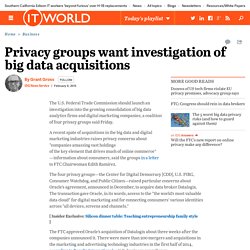
Federal Trade Commission should launch an investigation into the growing consolidation of big data analytics firms and digital marketing companies, a coalition of four privacy groups said Friday. A recent spate of acquisitions in the big data and digital marketing industries raises privacy concerns about “companies amassing vast holdings of the key element that drives much of online commerce”—information about consumers, said the groups in a letter to FTC Chairwoman Edith Ramirez.
The four privacy groups—the Center for Digital Democracy [CDD], U.S. PIRG, Consumer Watchdog, and Public Citizen—raised particular concerns about Oracle’s agreement, announced in December, to acquire data broker Datalogix. The transaction gave Oracle, in its words, access to the “the world’s most valuable data cloud” for digital marketing and for connecting consumers’ various identities across “all devices, screens and channels.”
Big data is a privacy minefield. Our every move can now be monitored, recorded and monetised.
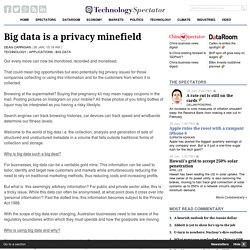
That could mean big opportunities but also potentially big privacy issues for those companies collecting or using this information and for the customers from whom it is collected. Browsing at the supermarket? Buying that pregnancy kit may mean nappy coupons in the mail. Posting pictures on Instagram on your mobile? All those photos of you toting bottles of liquor may be interpreted as you having a risky lifestyle. Search engines can track browsing histories, car devices can track speed and wristbands determine our fitness levels. Big Data: The Key Skills Businesses Need. A road map to the future for the auto industry. Automakers took center stage at the 1964 New York World’s Fair.
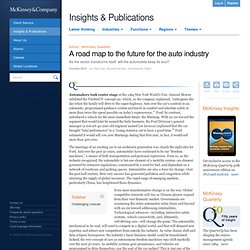
General Motors exhibited the Firebird IV concept car, which, as the company explained, “anticipates the day when the family will drive to the super-highway, turn over the car’s controls to an automatic, programmed guidance system and travel in comfort and absolute safety at more than twice the speed possible on today’s expressways.” Ford, by contrast, introduced a vehicle for the more immediate future: the Mustang.
With an eye toward the segment that would later be named the baby boomers, the Ford Division’s general manager (a not-yet-40-year-old engineer named Lee Iacocca) explained that the car brought “total performance” to a “young America out to have a good time.” Ford estimated it would sell 100,000 Mustangs during that first year; in fact, it would sell more than 400,000.
Big Data Management. Data-Driven Tech Industry Is Shaken by Online Privacy Fears. Much ado about ‘Big Data’ “Big data” is the newest buzz-phrase that dominates technology discussions.
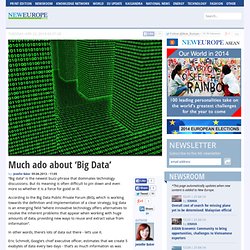
But its meaning is often difficult to pin down and even more so whether it is a force for good or ill. According to the Big Data Public Private Forum (BIG), which is working towards the definition and implementation of a clear strategy, big data is an emerging field “where innovative technology offers alternatives to resolve the inherent problems that appear when working with huge amounts of data, providing new ways to reuse and extract value from information”. In other words, there’s lots of data out there - let’s use it. Eric Schmidt, Google’s chief executive officer, estimates that we create 5 exabytes of data every two days - that’s as much information as was created from the dawn of civilisation to 2003.
And this data explosion is growing at a rate of 40 per cent per year. According to Digital Agenda Commissioner Neelie Kroes, this is a market worth tens if not hundreds of billions of euros per year.
Nathan Pearce: Is Big Data Building Self-Aware Security? Information overload is a problem which plagues most companies today; so much so that it has claimed the moniker 'big data'.
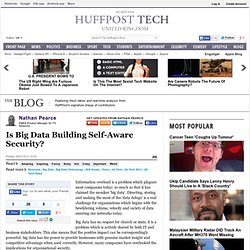
Directing, storing and making the most of the 'data deluge' is a real challenge for organisations which begins with the bewildering volume, velocity and variety of data entering our networks today. Big data has no respect for church or state; it is a problem which is actively shared by both IT and business stakeholders. This also means that the positive impact can be correspondingly powerful: big data has the power to provide businesses with genuine market insight and competitive advantage when used correctly. However, many companies have overlooked the implications for organisational security.
Data base of ruin Paul Ohm. Information becomes currency/privacy issues. Big Data for All. Much has been written over the past couple of years about “big data” (See, for example, here and here and here).
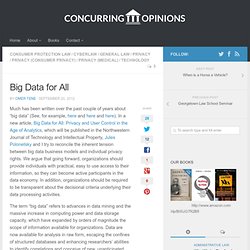
In a new article, Big Data for All: Privacy and User Control in the Age of Analytics, which will be published in the Northwestern Journal of Technology and Intellectual Property, Jules Polonetsky and I try to reconcile the inherent tension between big data business models and individual privacy rights. We argue that going forward, organizations should provide individuals with practical, easy to use access to their information, so they can become active participants in the data economy. In addition, organizations should be required to be transparent about the decisional criteria underlying their data processing activities. Reinventing Society In The Wake Of Big Data. What those breadcrumbs tell is the story of your life.
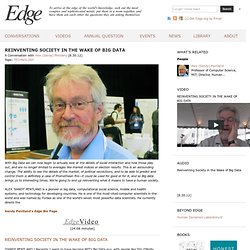
It tells what you've chosen to do. That's very different than what you put on Facebook. What you put on Facebook is what you would like to tell people, edited according to the standards of the day. Who you actually are is determined by where you spend time, and which things you buy. Big data is increasingly about real behavior, and by analyzing this sort of data, scientists can tell an enormous amount about you. They can do this because the sort of person you are is largely determined by your social context, so if I can see some of your behaviors, I can infer the rest, just by comparing you to the people in your crowd.
As a consequence analysis of Big Data is increasingly about finding connections, connections with the people around you, and connections between people's behavior and outcomes. Understanding these human-machine systems is what's going to make our future social systems stable and safe.